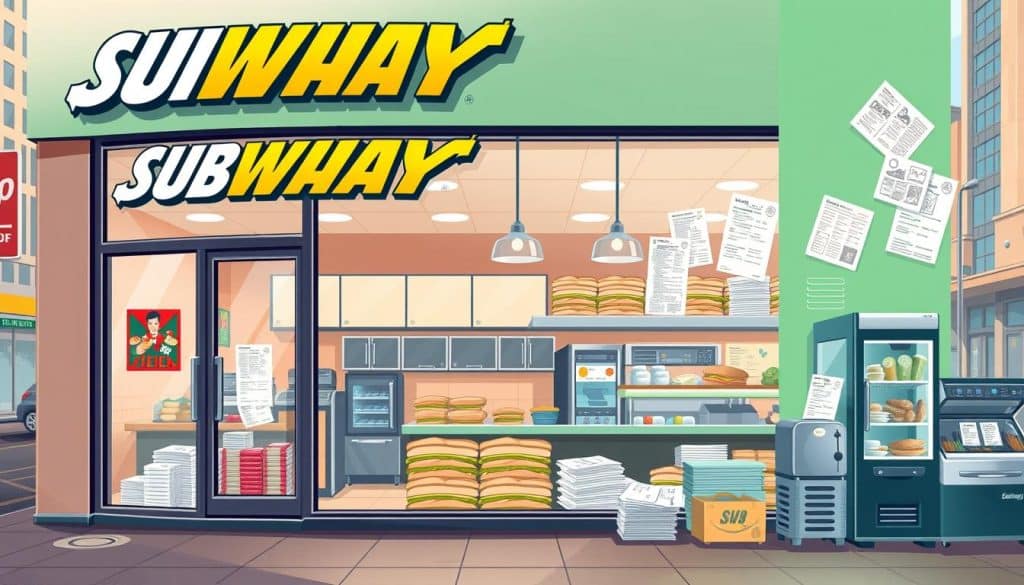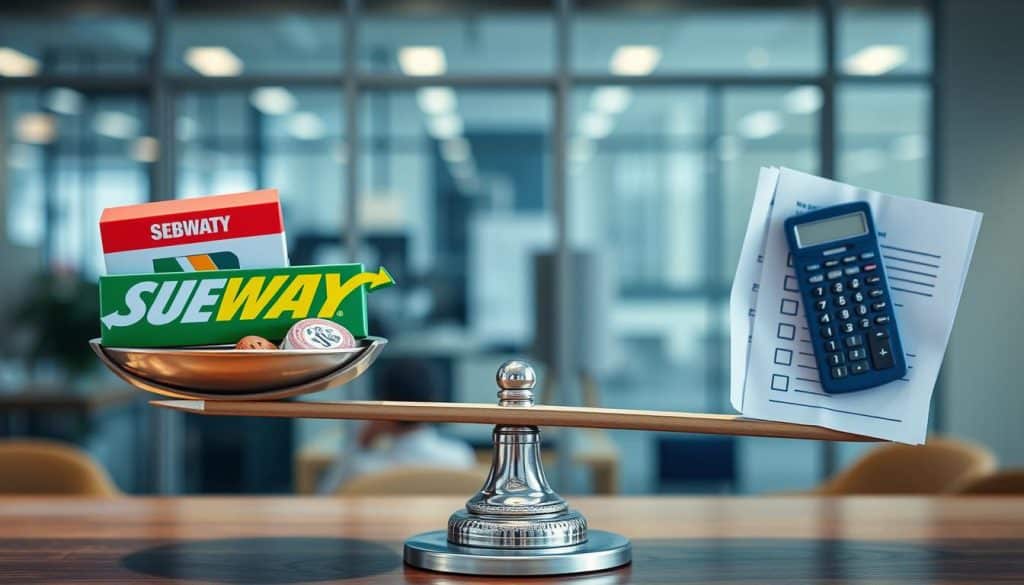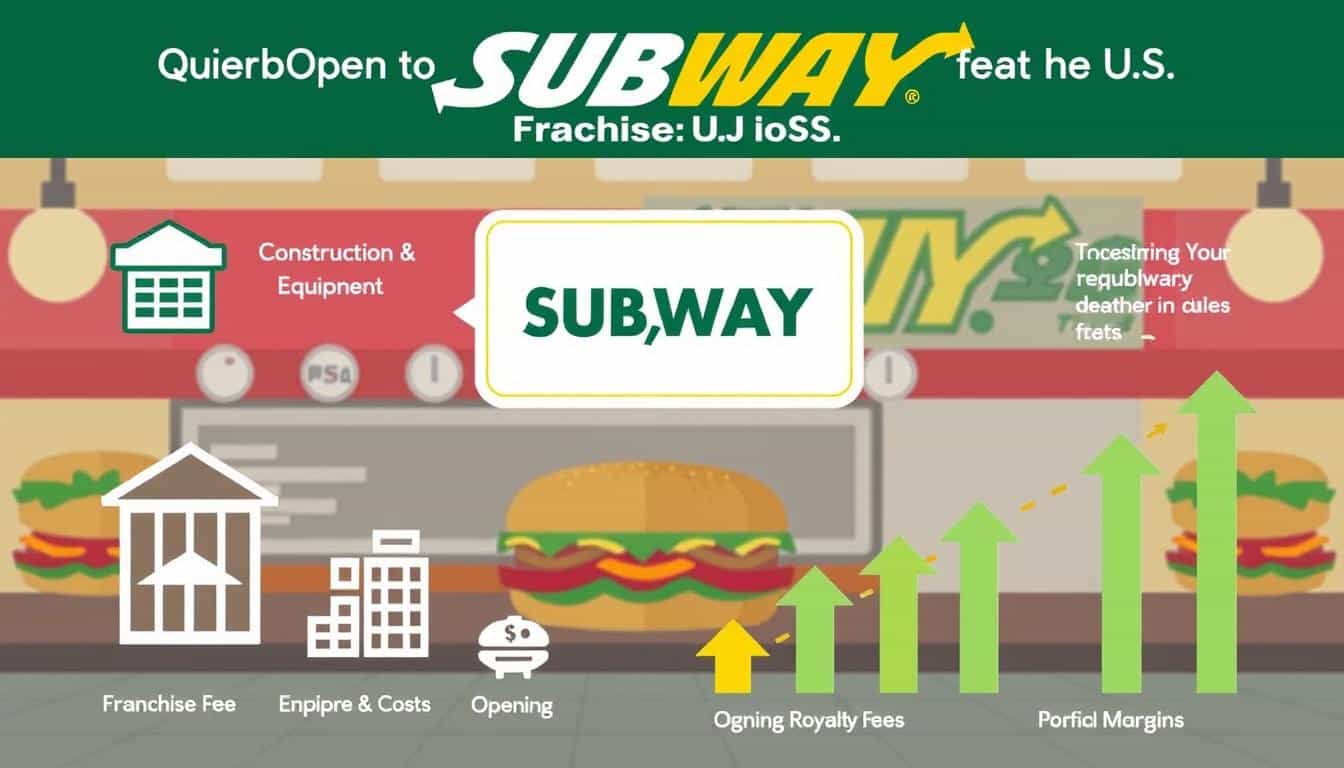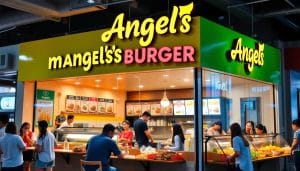Ever thought about the real cost of joining the Subway franchise family? Franchise fees are often around $15,000. But, the total investment is much more than that. It can range from $229,050 to $522,300, covering lease agreements, equipment, and initial supplies.
Subway also requires franchisees to have a minimum net worth of $150,000. They also need at least $100,000 in liquid assets. Knowing these details is key for anyone looking to invest in a Subway franchise.
Key Takeaways
- The initial franchise fee for Subway is approximately $15,000.
- Total start-up costs typically range from $229,050 to $522,300.
- Subway requires a minimum net worth of $150,000 for franchisees.
- Franchisees need at least $100,000 in liquid assets to open a Subway.
- Royalties and marketing fees amount to 12.5% of gross sales combined.
Understanding Subway Franchise Basics
For those thinking about starting a Subway franchise, it’s key to know the basics. A Subway franchise lets you run a business with the Subway brand. This brand is known for its customizable sandwiches and healthy food. Subway started in 1965 and now has over 37,000 locations in nearly 100 countries.
This wide reach gives franchisees a chance to join a well-known brand. It’s a great opportunity for those looking to start a business.
What is a Subway Franchise?
A Subway franchise lets entrepreneurs run a Subway restaurant. The franchise system offers support like training and guidelines. Knowing what is a subway franchise shows the value of Subway’s brand and the effort needed to keep standards high.
How the Subway Model Works
The Subway model focuses on fresh ingredients and letting customers choose. This draws in people who want quick, healthy meals. Franchisees must follow Subway’s rules to ensure quality and consistency.
The subway franchise ownership cost covers initial fees, equipment, and royalties. This setup helps owners benefit from Subway’s marketing and operational help. It’s a win-win for Subway and its franchisees.
Initial Investment Breakdown
Starting a Subway franchise needs a clear understanding of the initial costs. The franchise fee starts at about $15,000. But, it can change based on certain situations. Some options might let you start with a fee as low as $7,500 or even $0 in some cases.
Other costs like location fees and deposits also play a part. These can vary from $2,050 to $14,500.
Franchise Fee Overview
The franchise fee is the first big investment for new owners. The standard fee is $15,000, but some might get a discount. Other costs include equipment, furnishings, and decor, adding $75,000 to $150,000 to the total.
Franchisees also need to budget for insurance, training, and legal fees. These add up, making the total cost higher.
Costs of Equipment and Supplies
Equipment and supplies costs are key in the initial investment. Equipment alone can cost between $75,000 to $150,000. This shows the importance of careful financial planning.
Initial supplies also add to the cost, estimated at $8,725 to $14,725. The total initial investment can range from $207,050 to $476,900. It’s essential for future franchisees to consider all costs for a successful start.
Ongoing Fees and Royalties
When you think about getting a Subway franchise, knowing the ongoing fees is key. It helps you see if the investment will pay off in the long run. You’ll need to handle costs like royalty fees and marketing contributions.
Royalty Fees Structure
Subway franchisees pay an ongoing royalty fee of 8% based on gross sales. This fee lets you use the Subway brand and get support to help your business succeed. The royalty structure keeps the Subway experience the same everywhere.
Marketing Fund Contributions
Franchise owners also give 4.5% of gross sales to a marketing fund. This fund supports national ads and promotions. It’s important for keeping the brand in front of customers and boosting sales. Managing these fees well is key to making your business profitable.
For a detailed look at Subway franchise costs and ongoing fees, check out this resource. Knowing these costs helps you decide if a Subway franchise fits your business goals.
Additional Start-Up Costs
Thinking about starting a Subway franchise? You need to know about extra costs. These costs are more than the initial fee and buying equipment. A big part of the budget goes to lease and renovation costs. These can change a lot based on the location and the building’s state.
Renovation costs can be from $40,900 to $200,000. This depends on how much the place needs to be fixed up to meet Subway’s standards and local laws.
Lease and Renovation Expenses
Finding the right leasing space is key for Subway’s success. The location affects how many people see your store and if it can make money. You must include lease and renovation costs in your financial plan.
These costs cover the security deposit, monthly rent, and any big changes needed. Before you start, think about these expenses to see if you can afford them.
Inventory and Operational Costs
There are also costs for the first batch of products, which can be $4,400 to $6,050. This stock helps your store offer products right away. Also, think about ongoing costs like utilities, labor, and supplies.
These costs affect how much money your business makes. Make sure to include them in your financial plans to keep your business healthy and running smoothly.

Financing Options for Prospective Owners
Thinking about a Subway franchise? Knowing your financing options is key. There are many ways to get the money you need, like loans from banks. Banks are a common choice for financing your Subway venture.
Traditional Bank Loans
Bank loans are a top choice for many. Banks have loans made just for starting a franchise. These loans can cover costs from $100,000 to $300,000.
What banks look at includes your credit score and how much money you have. They also check if your franchise can make money. Knowing what banks want can make getting a loan easier.
Franchise-Specific Financing Programs
There are special financing programs for Subway franchises. These programs have better terms for new businesses. Franchisors often help find lenders who know about franchises.
These programs might offer lower interest rates or longer to pay back. Using these options can make starting your Subway franchise easier.
Profit Potencial and Earnings
Understanding the financial outcomes of a Subway franchise is key for those interested in owning one. The profit can vary a lot. This depends on location, how well the store runs, and the competition.
Average Earnings for Franchise Owners
Subway franchise owners usually make between $30,000 and $70,000 a year. Around 40% to 50% of them make more than this, thanks to busy locations. Some owners even make close to $490,000 annually.
The profit margins can be between 10% and 22%. This means net earnings can range from $50,000 to $72,000. Owners with more than one store do even better. Those with two to four stores average around $142,638. Those with five or more stores make about $214,418.
Factors Affecting Profitability
Several things can affect how much money a Subway franchise makes. Where the store is located is very important. Busy areas with lots of people walking by tend to do better.
Good marketing can also help increase earnings. Seasonal changes can affect how much money is made, as some times are busier than others. The design of the store can also impact sales. While there’s a chance for good profits, owners face challenges and income changes.
Comparing Subway with Other Franchises
The fast-food industry has many opportunities for franchisees. Subway is unique, with its own benefits and challenges. Knowing these can help new owners decide if Subway is right for them.
Advantages of a Subway Franchise
Subway has a lower initial investment compared to many others. It costs between $238,623 and $536,745 to start. Subway also offers a lot of support, helping with operations, marketing, and training.
Subway is well-known worldwide, with nearly 44,000 locations in over 100 countries. Its menu can be tailored to local tastes, making customers happy. Plus, Subway’s healthy food options are popular today.
Challenges Compared to Competitors
Subway has its own challenges, though. There are ongoing royalty fees and weekly sales targets. These can affect profits, as the market is very competitive.
The fast-food market is huge, valued at $255.4 billion in 2023 and expected to grow. With big names like McDonald’s, owners must stay creative to keep customers coming back.
Conclusion: Is Subway Right for You?
Thinking about investing in a Subway franchise is a big step. It’s important to check if it fits your goals and financial situation. You should also think about your skills in running a business.
The success of a Subway franchise depends a lot on the local market. Subway has a low entry cost, starting at $15,000. The total investment can be between $116,000 and $263,000. This makes Subway a good choice for many investors.
Evaluating Personal and Financial Goals
It’s key to understand the financial side of owning a Subway. You’ll need to pay ongoing royalties and marketing fees. Subway has a strong supply chain, ensuring quality ingredients.
With inflation, keeping an eye on costs and customer loyalty is vital. Subway focuses on fresh, made-to-order food. This meets today’s demand for healthier meals.
Resources for Further Research
There are many Subway franchise resources to help you decide. You can find franchise disclosure documents, financial guides, and consulting services. These tools provide insights tailored to your needs.
Using these resources will help you make a well-informed choice. It sets a strong base for your Subway franchise journey.

Next Steps for Interested Franchisees
If you’re thinking about getting a Subway franchise, it’s important to take the right steps. Start by reaching out to Subway for details on their franchise model. Also, consider going to introductory meetings to learn more about what it takes to own a Subway.
By talking to Subway, you can get the info you need to make a smart choice.
Contacting Subway for More Information
When you contact Subway, you’ll get valuable insights. You’ll learn about the benefits of their franchising model. This includes getting exclusive territory rights, which can help you stand out.
Knowing the brand’s reputation is also key. Subway is known for being reputable, which can help your business succeed.
Preparing a Business Plan
After getting the initial info, it’s time to make a business plan. This plan should cover how you’ll run your Subway, your finances, and marketing. It’s important to have a detailed plan.
Franchises often get easier access to money. A good plan helps you get funding and guides you through challenges.





